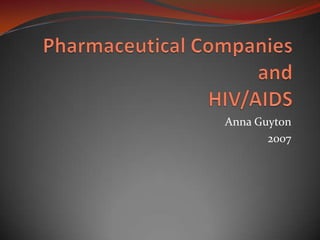
Pharmaceuticals and HIV/AIDS
- 1. Pharmaceutical Companies and HIV/AIDS Anna Guyton 2007
- 2. What about generic drugs? TRIPs – Trade Related Aspects of Intellectual Property Uruguay Round of trade negotiations (1994) A single standard for intellectual property law on the world raise the price of drugs to levels that were unaffordable in much of the world Big drug companies want TRIPs to make it more difficult for generics to be produced Profits = keeping as many generic drugs as possible off the market as long as possible
- 3. Why keep generics off the market? Higher prices = more research? …Not really More $ spent on advertising than on research More research on lifestyle drugs than for disease Little research done on disease affecting LDCs Basic research funded by government Companies make huge profit!
- 4. Why keep generics off the market? Allowing trade in generic drugs means low drug prices elsewhere will spoil domestic market Already huge disparities (Europe); problem limited Pharmaceuticals industry very regulated Most of the cost paid by insurance companies and governments Difficult to get drugs outside domestic economy
- 5. Counterargument Providing LDCs with lifesaving drugs will: Have a negligible effect on drug companies’ investments in the diseases that affect LDCs Have a negligible effect on drug companies’ revenue (little revenue to begin with—under 2%) Save lives Increase productivity and economic efficiency in LDCs
- 6. Knowledge and Innovation Knowledge is a public good Restricting knowledge = inefficiency and a lower pace of innovation Restricting knowledge in the case of AIDS medications = death “The marvels of modern medicine are truly astonishing; but the gap between the successes of the sciences in finding cures and the failures of the social sciences in finding ways of ensuring that the benefits of that knowledge are made available to all is equally astonishing.” –Joseph Stiglitz
- 7. Solution #1 Advanced industrial countries provide drugs or at least subsidize them Criticism: free-riding on industrial countries Response: yes, and they should No additional cost for developed countries (knowledge is a public good) Benefits to developing countries enormous
- 8. Solution #2 Compulsory licensing (when there is an urgent need to broaden access to technology or medicines) Right recognized globally 2001 Anthrax scare and Cipro Firms can produce a drug and sell it at just above cost Efficiency = lots of money saved
- 9. Solution #3 A market-based incentive: a guarantee fund Developed world governments make a purchase guarantee Criticism: still monopoly problem and creates a winner-takes-all system
- 10. Solution #4 Innovation fund (prize system) Really important discoveries get really big rewards Allows for generic production Benefits developing countries (low-cost drugs) Benefits developed countries (improved knowledge) Bonus: developed-country governments able to aid the developing world without worrying whether the money will be well spent.
Notas do Editor
- lifestyle drugs (e.g., drugs for hair growth or male impotence)
- African sales represent under 2 percent of the total—because the people are simply too poor to buy expensive drugs; and they spend little on the diseases that most affect developing countries.
- 2001 anthrax scare, the U.S. government threatened to force the drug company Bayer to allow others to produce Cipro, the antibiotic most effective against anthrax at that time.For instance, Brazil’s state-run drug company, Farmanguinhos, estimates that in can produce the AIDS medicine Kaletra for a fraction of what Abbott charges in the United States. With more than 600,000 HIV-positive patients in the country, at one time, it was estimated that a generic Kaletra would save Brazil some $55 million off even the highly discounted price at which Abbott was then selling the drug to Brazil.
- The prize fund concept has been championed by James Love and the Consumer Project on Technology. Congressman Bernard Sanders introduced HR 417, the Medical Innovation Prize Act of 2005, to implement the idea.)